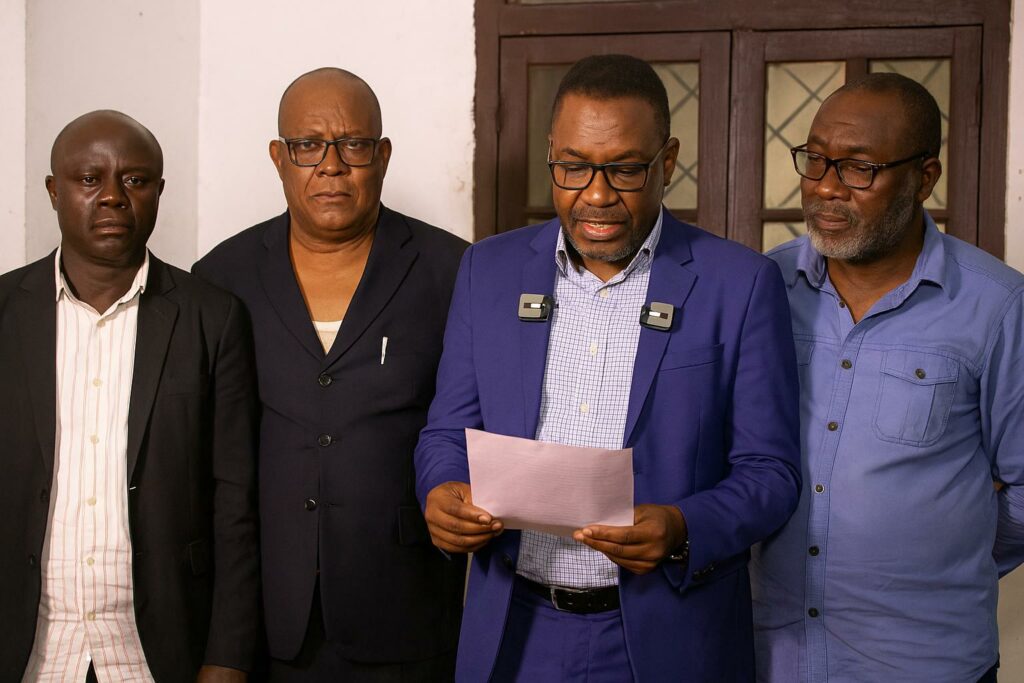A measured warning from the inter-union college
The inter-union college of Marien Ngouabi University in Brazzaville deposited on 3 October a meticulously phrased, four-day strike notice that it presents as a “last resort” before more disruptive actions. Behind the communiqué stand the Syndicat du personnel non-enseignant du supérieur (SYPENES), the Syndicat national de l’université (SYNALU) and the Syndicat des enseignants du supérieur (SYNESUP), three representative bodies whose convergent positions confer unusual cohesion on a traditionally fragmented social landscape. Their stated objective is not confrontation but a “return to the spirit of the commitments” that, according to them, framed earlier talks with governmental interlocutors.
Core demands: wages, overtime and social coverage
The grievance platform centres on overdue remuneration. Union leaders recall that salaries for August and September 2024 remain outstanding, while those for July, August and September 2025 have been budgeted yet, in their words, “not effectively liquidated”. They also refer to overtime hours accumulated since 2018, pointing to the extra burden borne by academic and administrative staff striving to maintain teaching schedules despite rising enrolments. A third issue concerns social protection: the unions affirm that statutory contributions meant to be channelled via the Treasury to the relevant social-security funds have not been transferred, creating what they describe as a “double vulnerability” for employees—immediate loss of income and diminished long-term coverage.
Legal and financial parameters of the dispute
Under Congolese labour legislation, wages are a privileged claim, and public-sector pay falls within the annual finance law. Thus, the arrears cited by the inter-union college raise intricate questions of cash-flow management rather than legal validity, since the sums are already recognised. With regard to social-security transfers, the principle of employer responsibility is well established in OHADA space, yet implementation can be delayed when Treasury priorities tighten. Analysts note that the present dispute occurs against a backdrop of gradual fiscal consolidation efforts designed to preserve macro-economic stability in the post-pandemic era. In that sense, the conversation is less about principles than about sequencing and liquidity.
Government engagement and room for dialogue
Officials have repeatedly expressed appreciation for the “sense of duty” maintained by Marien Ngouabi staff during recent budgetary tensions, welcoming the calm climate underlined by the unions themselves. While the present notice signals impatience, it also leaves space for negotiation: the four-day window is meant to encourage technical meetings before any suspension of teaching. Sources close to the file underline that, in previous episodes, incremental disbursements were arranged once a detailed pay matrix had been validated jointly by the Ministry of Higher Education and the Ministry of Finance. Observers therefore expect renewed dialogue on a timetable aligning treasury capacity with academic imperatives.
Implications for students and the academic calendar
Marien Ngouabi University, the country’s flagship public institution, has over the years demonstrated resilience in continuing lectures, laboratory work and examinations despite periodic stoppages. Nonetheless, each interruption compresses curricula and delays graduations, with ripple effects on professional placements and national human-resources planning. By choosing an initial strike of limited duration, the unions signal their intent to safeguard the second-semester schedule, provided clarifications arrive promptly. Students’ associations, for their part, observe the process attentively, mindful that prolonged disruptions could affect scholarship disbursements and international mobility deadlines.
A broader socio-economic context
The episode should also be read in light of the wider social dialogue under way in Congo-Brazzaville’s public sector. Wage regularisation has progressed in several ministries, yet lags subsist in entities with complex staffing patterns such as universities and hospitals. Economists highlight that higher education, while non-commercial, contributes to the diversification strategy championed by authorities, notably through research projects linked to agriculture, energy and digital innovation. Ensuring predictable remuneration, they argue, is therefore not solely a labour issue but part of national competitiveness.
Outlook: from notice to negotiated solution
The unions have congratulated their members for remaining disciplined and invite them to “retain the same composure in the coming days”. That phrasing, echoing the government’s call for responsibility, suggests an environment conducive to compromise. In the immediate future, the decisive factor will be whether the Treasury can unlock partial payments or present a credible roadmap before the strike clock expires. Should that occur, observers expect the notice to be lifted and working groups to resume on overtime and social-security files. Conversely, absent tangible progress, the inter-union college could extend or escalate its action, though history indicates that both sides favour incremental, negotiated adjustments.
Over the medium term, the situation at Marien Ngouabi University will remain a barometer of broader public-sector human-resources management. For officials and unionists alike, the lesson is clear: constructive dialogue, underpinned by transparent data on dues and disbursements, offers the surest path to reconciling budgetary prudence with the essential continuity of academic service.

